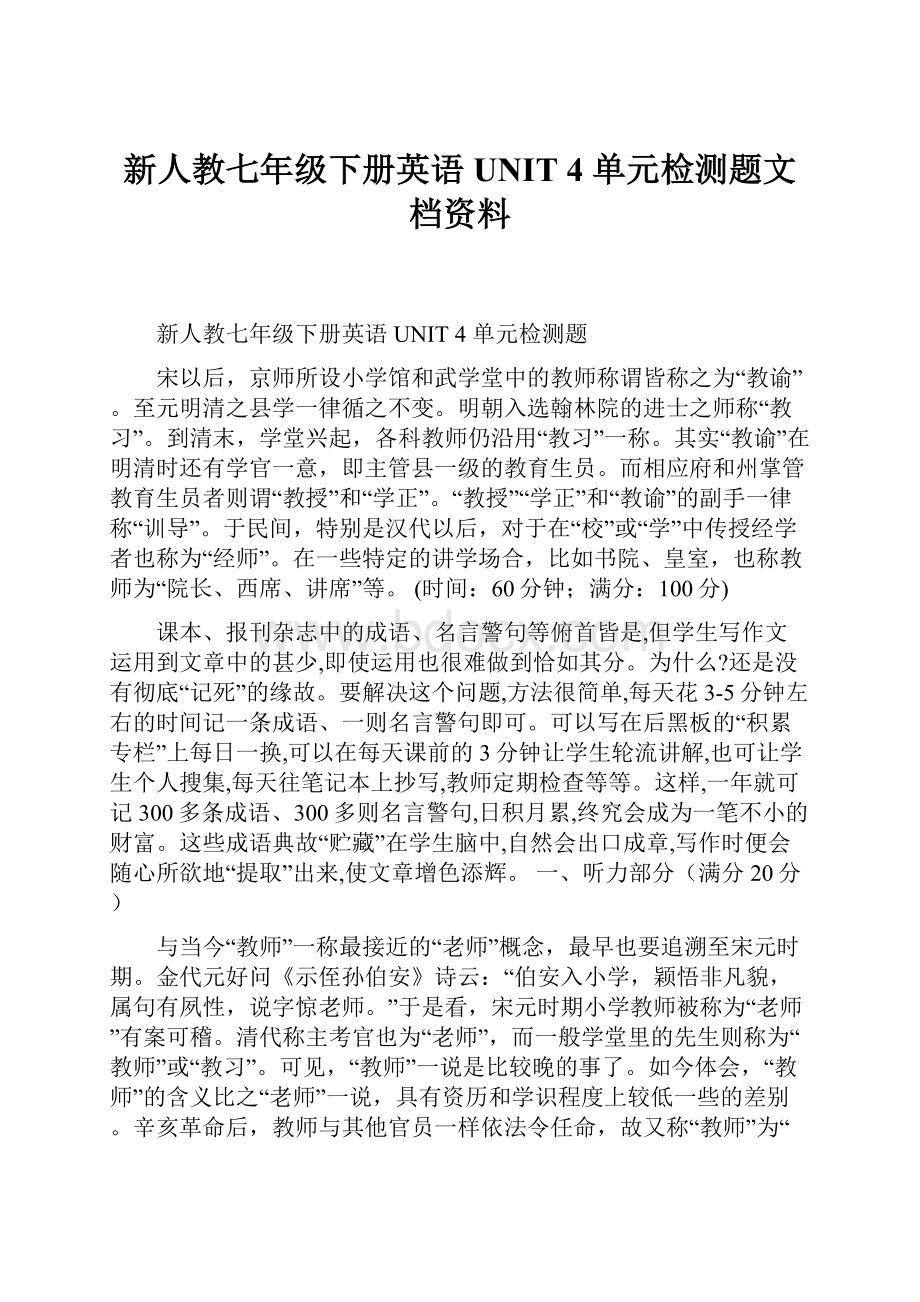新人教七年级下册英语UNIT 4 单元检测题文档资料.docx
《新人教七年级下册英语UNIT 4 单元检测题文档资料.docx》由会员分享,可在线阅读,更多相关《新人教七年级下册英语UNIT 4 单元检测题文档资料.docx(13页珍藏版)》请在冰豆网上搜索。

新人教七年级下册英语UNIT4单元检测题文档资料
新人教七年级下册英语UNIT4单元检测题
宋以后,京师所设小学馆和武学堂中的教师称谓皆称之为“教谕”。
至元明清之县学一律循之不变。
明朝入选翰林院的进士之师称“教习”。
到清末,学堂兴起,各科教师仍沿用“教习”一称。
其实“教谕”在明清时还有学官一意,即主管县一级的教育生员。
而相应府和州掌管教育生员者则谓“教授”和“学正”。
“教授”“学正”和“教谕”的副手一律称“训导”。
于民间,特别是汉代以后,对于在“校”或“学”中传授经学者也称为“经师”。
在一些特定的讲学场合,比如书院、皇室,也称教师为“院长、西席、讲席”等。
(时间:
60分钟;满分:
100分)
课本、报刊杂志中的成语、名言警句等俯首皆是,但学生写作文运用到文章中的甚少,即使运用也很难做到恰如其分。
为什么?
还是没有彻底“记死”的缘故。
要解决这个问题,方法很简单,每天花3-5分钟左右的时间记一条成语、一则名言警句即可。
可以写在后黑板的“积累专栏”上每日一换,可以在每天课前的3分钟让学生轮流讲解,也可让学生个人搜集,每天往笔记本上抄写,教师定期检查等等。
这样,一年就可记300多条成语、300多则名言警句,日积月累,终究会成为一笔不小的财富。
这些成语典故“贮藏”在学生脑中,自然会出口成章,写作时便会随心所欲地“提取”出来,使文章增色添辉。
一、听力部分(满分20分)
与当今“教师”一称最接近的“老师”概念,最早也要追溯至宋元时期。
金代元好问《示侄孙伯安》诗云:
“伯安入小学,颖悟非凡貌,属句有夙性,说字惊老师。
”于是看,宋元时期小学教师被称为“老师”有案可稽。
清代称主考官也为“老师”,而一般学堂里的先生则称为“教师”或“教习”。
可见,“教师”一说是比较晚的事了。
如今体会,“教师”的含义比之“老师”一说,具有资历和学识程度上较低一些的差别。
辛亥革命后,教师与其他官员一样依法令任命,故又称“教师”为“教员”。
Ⅰ.听句子,选择与内容相符的图片。
(每个句子读一遍)(每小题1分,满分5分)
这个工作可让学生分组负责收集整理,登在小黑板上,每周一换。
要求学生抽空抄录并且阅读成诵。
其目的在于扩大学生的知识面,引导学生关注社会,热爱生活,所以内容要尽量广泛一些,可以分为人生、价值、理想、学习、成长、责任、友谊、爱心、探索、环保等多方面。
如此下去,除假期外,一年便可以积累40多则材料。
如果学生的脑海里有了众多的鲜活生动的材料,写起文章来还用乱翻参考书吗?
A.B.C.D.E.
“教书先生”恐怕是市井百姓最为熟悉的一种称呼,从最初的门馆、私塾到晚清的学堂,“教书先生”那一行当怎么说也算是让国人景仰甚或敬畏的一种社会职业。
只是更早的“先生”概念并非源于教书,最初出现的“先生”一词也并非有传授知识那般的含义。
《孟子》中的“先生何为出此言也?
”;《论语》中的“有酒食,先生馔”;《国策》中的“先生坐,何至于此?
”等等,均指“先生”为父兄或有学问、有德行的长辈。
其实《国策》中本身就有“先生长者,有德之称”的说法。
可见“先生”之原意非真正的“教师”之意,倒是与当今“先生”的称呼更接近。
看来,“先生”之本源含义在于礼貌和尊称,并非具学问者的专称。
称“老师”为“先生”的记载,首见于《礼记?
曲礼》,有“从于先生,不越礼而与人言”,其中之“先生”意为“年长、资深之传授知识者”,与教师、老师之意基本一致。
1._________2._________3._________4._________5._________
Ⅱ.听句子,选择恰当的答语。
(每个句子读一遍)(每小题1分,满分5分)
6.A.Yes,Ican’t.B.No,Ican’t.C.Yes,Iam.
7.A.Yes,Ihave.B.Yes,Ido.C.Yes,Iam.
8.A.That’sallright.B.Thatsoundsgood.C.Sorry,MrSmith.
9.A.Domyhomework.B.Yes,Ido.C.No,Idon’t.
10.A.No,youcan’t.B.Yes,you’relucky.C.You’reright.
Ⅲ.听对话,根据对话内容选择正确的答案。
(每段对话读两遍)(每小题1分,满分5分)
11.Whendoestheboyusuallygotobed?
A.Before10:
30p.m.B.At11:
00p.m.C.Atabout11:
30p.m.
12.WhatdoesTomalwaysdointheclassroom?
A.Listenstomusic.B.Eatssomething.C.Runsaround.
13.WhatdoesJimoftendoonthebus?
A.Readsbooks.B.Speaksloudly.C.Sleeps.
14.WhencantheboywatchTVathome?
A.OnSunday.B.OnSaturday.C.OnFriday.
15.WhatdoestheboyusuallydofromMondaytoFriday?
A.Hedoeshishomeworkandlistenstomusic.
B.Helistenstomusicandcleanshisroom.
C.Hedoeshishomeworkandtakesawalk.
Ⅳ.听短文,在短文的空白处填写所缺的单词。
(短文读两遍)(每小题1分,满分5分)
16toourschool,Jack.Herearesomeofourschool17.Wecan’t18lateforclass.Wecan’t19tomusicinclass,ei
ther.Wecan’ttalkloudlyinthelibrary.Wehaveto20inthediningroomandwehavetowearschooluniformsonschooldays.
16._________17._________18._________19._________20._________
二、笔试部分(满分80分)
Ⅰ.单项填空(每小题1.5分,满分15分)
1.Wecan’
tlistento_______inclass.
A.musicB.themusicC.musicsD.themusics
2.Itwasdarkbythetimewearrived_______thestation.
A.forB.toC.atD.in
3.Theteacherisverystrict_______hisstudents.
A.withB.inC.forD.to
4.Ihavetopractice________Englisheveryday.
A.speakB.tospeakC.speaksD.speaking
5.Annie’sbikeisbroken,soshe_______walktoschool.
A.havetoB.hastoC
.needtoD.should
6.Hisdogwaslost,thatmadehimfeel_______.
A.sadB.sadlyC.happyD.happily
7.Don’teatinclass_______don’tleaveyourseatsinclass.
A.orB.soC.butD.and
8.Theyfought_______theItaliansinthelastwar,but_______theminthiswar.
A.with;withB.with;for
C.against;
againstD.with;against
9.Don’t________intheclassroom.
A.noisyB.benoisyC.isnoisyD.benoise
10.Daisyhasto_______theclassroomafterschool.
A.cleansB.cleanedC.cleaningD.clean
Ⅱ.完形填空(每小题1.5分,满分15分)
JohnisanAmericanboy.Helikes11footballmatches,12hedoesn’thaveenoughmoneytobuytickets.Hehastowat
chthematches13TVathomewhenhehas14homework.HemustgotoschoolfromMondaytoFriday,sohemissesalotofimportantmatches.
Abigfootballmatchwillbeheldintheafternoontomorrow.15wantstowatchitverymuch,buthecan’t.Hewillhaveaphysicstest(考试)in16afternoon.“Canwehaveavideo,Mum?
”Johnaskshismother17hegoestoschool.“ThenfromourTVsetyoucanrecordthematchforme
.”“I’m18wecan’tafford(买得起)one,”sighs(叹息)hismother.Thenext
morningJohncomeshomewithasmile,19anewvideo.“Butwheredoyougetthemoney,John?
”hismotherasksinsurprise.
“That’s20,Mum.I’vesoldourTVset.”
11.A.watchingB.seeingC.lookingatB.hearing
12.A.andB.soC.butD.though
13.A.inB.onC.atD.with
14.A.fewB.afewC.littleD.quitealittle
15.A.MotherB.FatherC.TeacherD.John
16.A.thesameB.thedifferentC.aD.an
17.A.afterB.beforeC.becauseD.as
18.A.gladB.afraidC.pleasedD.frightened
19.A.carryingB.carriesC.carryD.tocarry
20.A.difficultB.easyC.difficultyD.easily
Ⅲ.阅读理解(每小题2分,满分20分)
A
TheWenhuaInternationalSchool
Youmust
Youmustn’t
Arriveatschoolbyhalfpast
seveneverymorning.
Wearjeans.
Handinyourhomeworkbyeight.
Eatordrinkintheclassroom.
Lookcle
anandtidy.
BringMP3toschool.
Bequietinthelibrary.
Runorshoutintheschoolbuildings.
Stayontheplaygroundatbreaktime.
Talkloudlyinthehallways.
Standupwhenateachercomesintotheclassroom.
Fight.
21.Whatcan’tyoudowhenyouareintheschoolbuildings?
A.Eatordrink.B.Runor
shout.C.Talkloudly.D.Listentomusic.
22.CanyoubringyourMP3toschool?
A.No,wecan’t.B.Yes,wecan.C.No,theycan’t.D.Yes,theycan.
23.Whatdoyouhavetodowhenyourteachercomesintotheclassroom?
A.Handinmyhomework.B.Bequiet.
C.Standup.D.Cleantheclassroom.
24.Canyoufightintheschool?
A.Idon’tknow.B.No,wecan’t.C.Yes,wecan.D.Yes,wemust.
25.Whendoyouhavetogettoschooleverymorning?
A.Byhalfpastseven.B.Byeight.
C.Byhalfpasteight.D.Byseven.
B
Hi,boysandgirls!
Welcometoourmuseum.It’sfree.Youdon’thavetopayanymoney.Butwehavesomerulesforyou.PleaserememberthemanddoasIsay.Firstly,don’thavefoodordrinkhere.Youmaymakeou
rmuseumdirty.Secondly,youcantakephotoshere,butdon’ttouch(触摸)thethingshere.Thirdly,keepquiet
inthemuseum.Don’ttalkloudly.Fourthly,themuseumisnotopenafterfiveo’clockintheafternoon.Pleaseleave(离开)beforefive.Haveagoodtimehere!
Thankyou.
26.Therearesomerulesfora.
A.storeB.parkC.s
choolD.museum
27.What’stheChinesemeaningoftheword“free”inthearticle?
A.免费的B.迅速的C.高兴的D.自由的
28.Studentscaninthemuseum.
A.havefoodanddrinkB.takephotos
C.touchthethings
D.talkloudly
29.Studentscanstayinthemuseum.
A.alldayB.before5:
00a.m.
C.before5:
00p.m.D.after5:
00p.m.
30.Wecanlearnfromt
hearticlethat.
A.studentsdon’twanttopayanymoney
B.themuseumhasfiverulesforthestudents
C.thespeakerwhotellsthestudentstherulesisateacher
D.thespeakerhopesthestudentshaveagoodtime
Ⅳ.根据句意及汉语提示完成单词(每小题1分,满分5分)
31.Rulesarevery_______(重要的)here.
32.Ina______(可怕的)stormtheshiphitarockandbrokei
ntopieces.
33.She_______(记得)thatshewasgoingtothesocialclubthatevening.
34.Heis_______(学习)toplaythepiano.
35.To_______(保持)warmtheyburntwoodinasmallroom.
Ⅴ.用所给单词的适当形式填空(每小题1分,满分5分)
36.Canwe________(wear)hatsinschool?
37._________(notbe)late.It’syourfirstdaytoschool.
38.There_______(be)alotofbooksonthedesk.
39.Youmustremember(clean)theclassroom.
40.Youdon’tlikesingingsongs.Idon’tlikeit,_______(too).
Ⅵ.句型转换(每小题1分,满分5分)
41.Studentscanrunandtalkloudlyinthehallways.(改为否定句)
Students__________run__________talkloudlyinthehallways.
42.MariahastopracticethepianoonSundays.(改为一般疑问句)
__________Maria____________________practicethepianoonSundays?
43.Youcan’teatintheclassroom.(改为否定祈使句)
____________________intheclassroom.
44.Youmustlookafteryoursister.(改为同义句)
You________________lookafteryoursister.
45.Theyhavetocleantheclassroomeveryday.(对画线部分提问)
__________________theyhaveto_________everyday?
Ⅶ.书面表达(满分15分)
无论在家里还是在学校里刘刚总有许多制度要遵守,他很苦恼。
于是,他就写信给他的好朋友Jack,倾诉他内心的不快。
请你根据汉语提示制订出他的rules,然后帮他写信给Jack。
词数不少于60词。
1.6:
30起床;2.在校穿校服;
3.上课不准迟到;4.上课时不能戴帽子;
5.在家不能看电视,每晚练钢琴;6.9:
00上床睡觉;
7.周末打扫房间,洗衣服。
_____________________________________________________________________________________________________________________________________________________________
______________________________________________________________________________________________________________________________________________________________
UNIT4Don’teatinclass.检测题听力原文及参考答案
一、听力部分
Ⅰ.听句子,选择与内容相符的图片。
(每个句子读一遍)
1.OnWednesdays,wehaveadrawingclass.
2.Pleasebequietinthelibrary.Don’ttalkloudly.
3.Don’ttalkwitheachotherinEnglishclass.
4.HecanwatchTVonSundaynight.
5.Ourteacherencouragesustotalkwitheachother
inour
compositionclass.
Ⅱ.听句子,选择恰当的答语。
(每个句子读一遍)
6.Canyouwearahatinclass,Lily?
7.Cindy,doyouhavetostayathomebyteno’clock?
8.Don’truninthehallways,Peter!
9.Whatdoyouhavetodoafterschool?
10.IcanwatchTVwhenIfinishmyhomework.
Ⅲ.听对话,根据对话内容选择正确的答案。
(每段对话读两遍)
11.W:
Whendoyouusuallygotobed?
M:
Inmyfamily,Imustgotobedbefore10:
30p.m.
12.W:
Tom,youalwayseatintheclassroom.
M:
Sorr